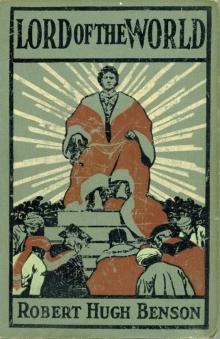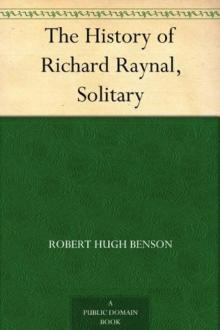- Home
- Robert Hugh Benson
Come Rack, Come Rope Page 20
Come Rack, Come Rope Read online
Page 20
“Does it concern myself or my business?” asked Robin promptly.
“It concerns you and every priest and every Catholic in England. It is what I have hinted to you before.”
“Then I will hear it.”
“It is as if I told it in confession?”
Robin paused.
“You may make it so,” he said, “if you choose.”
Anthony looked at him an instant. “Well,” he said, “I will not make a confession, because there is no use in that now—but——Well, listen!” he said, and sat down.
II
When he ceased, Robin lifted his head. He was as white as a sheet.
“You have been refused absolution before for this?”
“I was refused absolution by two priests; but I was granted it by a third.”
“Let me see that I have the tale right.
“Yourself, with a number of others, have bound yourselves by an oath to kill her Grace, and to set Mary on the throne. This has taken shape now since the beginning of the summer. You yourself are now living in Mr. Walsingham’s house, in Seething Lane; under the patronage of her Grace, and you show yourself freely at court. You have proceeded so far, under fear of Mr. Ballard’s arrest, as to provide one of your company with clothes and necessaries that can enable him to go to court; and it was your intention, as well as his, that he should take opportunity to kill her Grace. But to-day only you have become persuaded that the old design was the better; and you wish first to arrange matters with the Queen of the Scots, so that when all is ready, you may be the more sure of a rising when that her Grace is killed, and that the Duke of Parma may be in readiness to bring an army into England. It is still your intention to kill her Grace?”
“By God! it is!” said Anthony, between clenched teeth.
“Then I could not absolve you, even if you came to confession. You may be absolved from your allegiance, as we all are; but you are not absolved from charity and justice towards Elizabeth as a woman. I have consulted theologians on the very point; and——”
Then Anthony sprang up.
“See here, Robin; we must talk this out.” He flicked his fingers sharply. “See—we will talk of it as two friends.”
“You had better take back those words,” said the priest gravely.
“Why?”
“It would be my duty to lay an information! I understood you spoke to me as to a priest, though not in confession.”
“You would!” blazed the other.
“I should do so in conscience,” said the priest. “But you have not yet told me as a friend, and——”
“You mean——”
“I mean that so long as you choose to speak to me of it, now and here, it remains that I choose to regard it as sub sigillo in effect. But you must not come to me to-morrow, as if I knew it all in a plain way. I do not. I know it as a priest only.”
There was silence for a moment. Then Anthony stood up.
“I understand,” he said. “But you would refuse me absolution in any case?”
“I could not give you absolution so long as you intended to kill her Grace.”
Anthony made an impatient gesture.
“See here,” he said. “Let me tell you the whole matter from the beginning. Now listen.”
He settled himself again in his chair, and began.
“Robin,” he said, “you remember when I spoke to you in the inn on the way to Matstead; it must be seven or eight years gone now? Well, that was when the beginning was. There was no design then, such as we have to-day; but the general purpose was there. I had spoken with man after man; I had been to France, and seen Mr. Morgan there, Queen Mary’s man, and my lord of Glasgow; and all that I spoke with seemed of one mind—except my lord of Glasgow, who did not say much to me on the matter. But all at least were agreed that there would be no peace in England so long as Elizabeth sat on the throne.
“Well: it was after that that I fell in with Ballard, who was over here on some other affair; and I found him a man of the same mind as myself; he was all agog for Mary, and seemed afraid of nothing. Well; nothing was done for a great while. He wrote to me from France; I wrote back to him again, telling him the names of some of my friends. I went to see him in France two or three times; and I saw him here, when you yourself came over with him. But we did not know whom to trust. Neither had we any special design. Her Grace of the Scots went hither and thither under strong guards; and what I had done for her before——”
Robin looked up. He was still quite pale and quite quiet.
“What was that?” he said.
Anthony again made his impatient gesture. He was fiercely excited; but kept himself under tolerable control.
“Why, I have been her agent for a great while back, getting her letters through to her, and such like. But last year, when that damned Sir Amyas Paulet became her gaoler, I could do nothing. Two or three times my messenger was stopped, and the letters taken from him. Well; after that time I could do no more. There her Grace was, back again at Tutbury, and none could get near her. She might no more give alms, even, to the poor; and all her letters must go through Walsingham’s hands. And then God helped us: she was taken last autumn to Chartley, near by which is the house of the Giffords; and since that time we have been almost merry. Do you know Gilbert Gifford?”
“He hath been with the Jesuits, hath he not?”
“That is the man. Well, Mr. Gilbert Gifford hath been God’s angel to us. A quiet, still kind of a man—you have seen him?”
“I have spoken with him at Rheims,” said Robin. “I know nothing of him.”
“Well; he contrived the plan. He hath devised a beer-barrel that hath the beer all roundabout, so that when they push their rods in, there seems all beer within. But in the heart of the beer there is secured a little iron case; and within the iron case there is space for papers. Well, this barrel goes to and fro to Chartley and to a brewer that is a good Catholic; and within the case there are the letters. And in this way, all has been prepared——”
Robin looked up again. He remained quiet through all the story; and lifted no more than his eyes. His fingers played continually with a button on his doublet.
“You mean that Queen Mary hath consented to this?”
“Why, yes!”
“To her sister’s death?”
“Why, yes!”
“I do not believe it,” said the priest quietly. “On whose word does that stand?”
“Why, on her own! Whose else’s?” snapped Anthony.
“You mean, you have it in her own hand, signed by her name?”
“It is in Gifford’s hand! Is not that enough? And there is her seal to it. It is in cypher, of course. What would you have?”
“Where is she now?” asked Robin, paying no attention to the question.
“She hath just now been moved again to Tixall.”
“For what?”
“I do not know. What has that to do with the matter? She will be back soon again. I tell you all is arranged.”
“Tell me the rest of the story,” said the priest.
“There is not much more. So it stands at present. I tell you her Grace hath been tossed to and fro like a ball at play. She was at Chatsworth, as you know; she has been shut up in Chartley like a criminal; she was at Babington House even. God! if I had but known it in time!”
“In Babington House! Why, when was that?”
“Last year, early—with Sir Ralph Sadler, who was her gaoler then!” cried Anthony bitterly; “but for a night only.… I have sold the house.”
“Sold it!”
“I do not keep prisons,” snapped Anthony. “I will have none of it!”
“Well?”
“Well,” resumed the other man quietly. “I must say that when Ballard was taken——”
“When was that?”
“Last week only. Well, when he was taken I thought perhaps all was known. But I find Mr. Walsingham’s conversation very comforting, though little he kno
ws it, poor man. He knows that I am a Catholic; and he was lamenting to me only three days ago of the zeal of these informers. He said he could not save Ballard, so hot was the pursuit after him; that he would lose favour with her Grace if he did.”
“What comfort is there in that?”
“Why; it shows plain enough that nothing is known of the true facts. If they were after him for this design of ours do you think that Walsingham would speak like that? He would clap us all in ward—long ago.”
The young priest was silent. His head still whirled with the tale, and his heart was sick at the misery of it all. This was scarcely the home-coming he had looked for! He turned abruptly to the other.
“Anthony, lad,” he said, “I beseech you to give it up.”
Anthony smiled at him frankly. His excitement was sunk down again.
“You were always a little soft,” he said. “I remember you would have nought to do with us before. Why, we are at war, I tell you; and it is not we who declared it! They have made war on us now for the last twenty years and more. What of all the Catholics—priests and others—who have died on the gibbet, or rotted in prison? If her Grace makes war upon us, why should we not make war upon her Grace? Tell me that, then!”
“Anthony, I beseech you to give it up. I hate the whole matter, and fear it, too.”
“Fear it! Why, tell me what there is to fear? What hole can you find anywhere?”
“I do not know. I hardly know the tale yet. But it seems to me there might be a hundred.”
“Tell me one of them, then.”
Anthony threw himself back with an indulgent smile on his face.
“Why, if you will have it,” said Robin, roused by the contempt, “there is one great hole in this. All hangs upon Gifford’s word, as it seems to me. You have not spoken with Mary; you have not even her own hand on it.”
“Bah! Why, her Grace of the Scots cannot write in cypher, do you think?”
“I do not know how that may be. It may be so. But I say that all hangs upon Gifford.”
“And you think Gifford can be a liar and a knave!” sneered Anthony.
“I have not one word against him,” said the priest. “But neither had I against Thomas FitzHerbert; and you know what has befallen——”
Anthony snorted with disdain.
“Put your finger through another hole,” he said.
“Well—I like not the comfort that Mr. Secretary Walsingham has given you. You told me a while ago that Ballard was on the eve of going to France. Now Walsingham is no fool. I would to God he were! He has laid enough of our men by the heels already.”
“By God!” cried Anthony, roused again. “I would not willingly call you a fool either, my man! But do you not understand that Walsingham believes me as loyal as himself? Here have I been at court for the last year, bowing before her Grace, and never a word said to me on my religion. And here is Walsingham has bidden me to lodge in his house, in the midst of all his spider’s webs. Do you think he would do that if——”
“I think he might have done so,” said Robin slowly.
Anthony sprang to his feet.
“My Robin,” he said, “you were right enough when you said you would not join with us. You were not made for this work. You would see an enemy in your own father——”
He stopped confounded.
Robin smiled drearily.
“I have seen one in him,” he said.
Anthony clapped him on the shoulder, not unkindly.
“Forgive me, my Robin. I did not think what I said. Well; we will leave it at that. And you would not give me absolution?”
The priest shook his head.
“Then give me your blessing,” said Anthony, dropping on his knees. “And so we will close up the quasi-sigillum confessionis.”
III
It was a heavy-hearted priest that presently, downstairs, stood with Anthony in one of the guest-rooms, and was made known to half a dozen strangers. Every word that he had heard upstairs must be as if it had never been spoken, from the instant at which Anthony had first sat down to the instant in which he had kneeled down to receive his blessing. So much he knew from his studies at Rheims. He must be to each man that he met, that which he would have been to him an hour ago. Yet, though as a man he must know nothing, his priest’s heart was heavy in his breast. It was a strange homecoming—to pass from the ordered piety of the college: to the whirl of politics and plots in which good and evil span round together—honest and fiery zeal for God’s cause, mingled with what he was persuaded was crime and abomination. He had thought that a priest’s life would be a simple thing, but it seemed otherwise now.
He spoke with those half-dozen men—those who knew him well enough for a priest; and presently, when some of his own party came, drew aside again with Anthony, who began to tell him in a low voice of the personages there.
“These are all my private friends,” he said, “and some of them be men of substance in their own place. There is Mr. Charnoc, of Lancashire, he with the gilt sword. He is of the Court of her Grace, and comes and goes as he pleases. He is lodged in Whitehall, and comes here but to see his friends. And there is Mr. Savage, in the new clothes, with his beard cut short. He is a very honest fellow, but of a small substance, though of good family enough.”
“Her Grace has some of her ladies, too, that are Catholics, has she not?” asked Robin.
“There are two or three at least, and no trouble made. They hear Mass when they can at the Embassies. Mendoza is a very good friend of ours.”
Mr. Charnoc came up presently to the two. He was a cheerful-looking man, of northern descent, very particular in his clothes, with large gold ear-rings; he wore a short, pointed beard above his stiff ruff, and his eyes were bright and fanatical.
“You are from Rheims, I understand, Mr. Alban.”
He sat down with something of an air next to Robin.
“And your county——?” he asked.
“I am from Derbyshire, sir,” said Robin.
“From Derbyshire. Then you will have heard of Mistress Marjorie Manners, no doubt.”
“She is an old friend of mine,” said Robin, smiling. (The man had a great personal charm about him.)
“You are very happy in your friends, then,” said the other. “I have never spoken with her myself; but I hear of her continually as assisting our people—sending them now up into the Peak country, now into the towns, as the case may be—and never a mistake.”
It was delightful to Robin to hear her praised, and he talked of her keenly and volubly. Exactly that had happened which five years ago he would have thought impossible; for every trace of his old feeling towards her was gone, leaving behind, and that only in the very deepest intimacies of his thought, a sweet and pleasant romance, like the glow in the sky when the sun is gone down. Little by little that had come about which, in Marjorie, had transformed her when she first sent him to Rheims. It was not that reaction had followed; there was no contempt, either of her or of himself, for what he had once thought of her; but another great passion had risen above it—a passion of which the human lover cannot even guess, kindled for one that is greater than man; a passion fed, trained and pruned by those six years of studious peace at Rheims. There he had seen what Love could do when it could rise higher than its human channels; he had seen young men, scarcely older than himself, set out for England, as for their bridals, exultant and on fire; and back to Rheims had come again the news of their martyrdom: this one died, crying to Jesu as a home-coming child cries to his mother at the garden-gate; this one had said nothing upon the scaffold, but his face (they said who brought the news) had been as the face of Stephen at his stoning; and others had come back themselves, banished, with pain of death on their returning, yet back once more these had gone. And, last, more than once, there had crept back to Rheims, borne on a litter all the way from the coast, the phantom of a man who a year or two ago had played “cat” and shouted at the play—now a bent man, grey-haired, with great sc
ars on wrists and ankles.… Te Deums had been sung in the college chapel when the news of the deaths had come: there were no requiems for such as these; and the place of the martyr in the refectory was decked with flowers.… Robin had seen these things, and wondered whether his place, too, would some day be so decked.
For Marjorie, then, he felt nothing but a happy friendliness, and a real delight when he thought of seeing her again. It was glorious, he thought, that she had done so much; that her name was in all men’s mouths. And he had thought, when he had first gone to Rheims, that he would do all and she nothing! He had written to her then, freely and happily. He had told her that she must give him shelter some day, as she was doing for so many.
Meanwhile it was pleasant to hear her praises.
“ ‘Eve would be Eve,’ ” quoted Mr. Charnoc presently, in speaking of pious women’s obstinacy, “ ‘though Adam would say Nay.’ ”
Then, at last, when Mr. Charnoc said that he must be leaving for his own lodgings, and stood up; once more upon Robin’s heart there fell the horrible memory of all that he had heard upstairs.
CHAPTER II
I
IT WAS strange to Robin to walk about the City, and to view all that he saw from his new interior position. Now, his very presence was an offence: he had broken every law framed expressly against such cases as his; he had studied abroad, he had been “ordained beyond the seas”; he had read his Mass in his own bedchamber; he had, practically, received a confession; and it was his fixed and firm intention to “reconcile” as many of “her Grace’s subjects” as possible to the “Roman See.” And, to tell the truth, he found pleasure in the sheer adventure of it, as would every young man of spirit; and he wore his fine clothes, clinked his sword, and cocked his secular hat with delight.
The burden of what he had heard still was heavy on him. It was true that in a manner inconceivable to any but a priest it lay apart altogether from his common consciousness: he had talked freely enough to Mr. Charnoc and the rest; he could not, even by a momentary lapse, allow what he knew to colour even the thoughts by which he dealt with men in ordinary life; for though it was true that no confession had been made, yet it was in virtue of his priesthood that he had been told so much. Yet there were moments when he walked alone, with nothing else to distract him, when the cloud came down again; and there were moments, too, in spite of himself, when his heart beat with another emotion, when he pictured what might not be five years hence, if Elizabeth were taken out of the way and Mary reigned in her stead. He knew from his father how swiftly and enthusiastically the old Faith had come back with Mary Tudor after the winter of Edward’s reign. And if, as some estimated, a third of England were still convincedly Catholic, and perhaps not more than one twentieth convincedly Protestant, might not Mary Stuart, with her charm, accomplish more even than Mary Tudor with her lack of it?

 The Dawn of All
The Dawn of All By What Authority?
By What Authority? The King's Achievement
The King's Achievement Lord of the World
Lord of the World The History of Richard Raynal, Solitary
The History of Richard Raynal, Solitary Come Rack, Come Rope
Come Rack, Come Rope